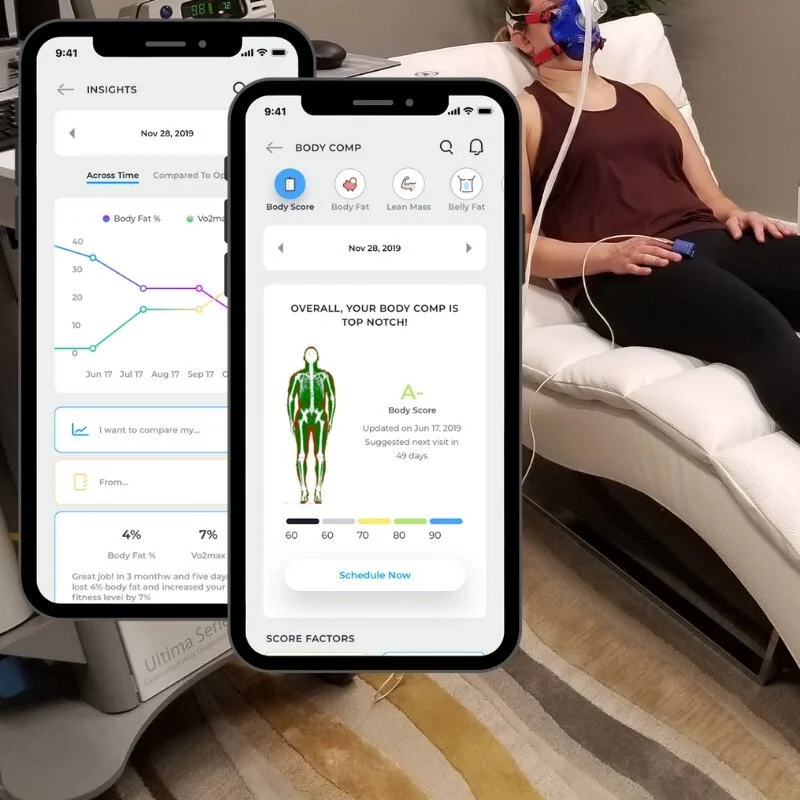The Truth About RMR and What It Really Tells You
You’ve probably heard the phrase "boost your metabolism" — but what does that actually mean? And how do we measure it?
At DexaFit, one of the most misunderstood — but most valuable — tests we offer is the Resting Metabolic Rate (RMR) test. It’s not just about how many calories you burn at rest. It’s a window into your metabolic flexibility, healthspan, and how your body adapts (or doesn’t) to change.
Let’s break it down.
🔥 What Is RMR — and How Is It Measured?
Your Resting Metabolic Rate (RMR) is the number of calories your body burns each day just to keep you alive. Think: breathing, brain function, pumping blood, cellular repair, etc. It accounts for about 60–75% of your total daily energy expenditure.
At DexaFit, we measure RMR using clinical-grade metabolic testing, which captures your actual oxygen intake and carbon dioxide output while you're reclining and fully relaxed.
No more guesstimating from an online calculator or smartwatch.
This is different from "estimates" given by fitness trackers, which are usually based on generic algorithms. Your body isn’t generic.
🧪 RMR vs. BMR: What’s the Difference?
These two terms are often used interchangeably — but they’re not the same.
BMR (Basal Metabolic Rate) is a theoretical value assuming zero movement or digestion, usually estimated from age, height, weight, and sex.
RMR (Resting Metabolic Rate) is measured in real life conditions, and includes minimal movement and the energy cost of digestion.
👉 Bottom line: RMR is more useful because it's measurable, testable, and specific to you.
🧬 RMR and Metabolic Flexibility
Here's where things get interesting. Your RMR test doesn’t just give you a calorie number. It can also reveal how well your body uses fat vs. carbohydrates at rest — a key indicator of metabolic flexibility.
A flexible metabolism can:
Efficiently switch between fuel sources (fat vs. carbs)
Support energy, mood, and weight regulation
Respond well to exercise and dietary changes
In our clinics, we often see clients who look healthy but are burning mostly carbohydrates at rest. That’s a red flag for poor metabolic health and may be linked to stress, under-eating, poor sleep, or insulin resistance.
🎯 Using RMR to Build Your Calorie Plan
Once you have your RMR, we layer in your:
Activity level
Workout intensity/frequency
Health or body comp goals
From here, we calculate your daily caloric needs for fat loss, maintenance, or muscle gain. This is the foundation of our MetaboliX Nutrition Blueprint, where we design a macro-balanced plan based on real data — not fads or generic charts.
Want to take it even further? We can combine your RMR results with:
Your DEXA scan (for lean mass vs. fat mass)
Your VO₂ Max test (for aerobic capacity + fuel usage)
Bloodwork (for hormones and metabolic markers)
🚫 Common Myths We Hear (and Bust)
“If I have a low RMR, I’m doomed.”
Not true. RMR is dynamic. You can improve it with strength training, proper fueling, and recovery.“Eating less always improves metabolism.”
Actually, chronic under-eating can cause your metabolism to adapt downward — making fat loss harder.“Thin people have fast metabolisms.”
RMR is influenced by lean mass. We've seen petite clients with higher RMRs than muscular ones who under-fuel and overtrain.“All RMRs are the same for the same weight.”
Nope. Two people at 170 lbs can have radically different metabolic profiles, depending on lean mass, hormones, sleep, and stress.
🧠 Here’s the Real Takeaway
Your metabolism isn’t a fixed number. It’s a dynamic system influenced by:
Muscle mass
Fuel availability
Stress levels
Hormones
Sleep quality
Nutrient timing
The RMR test is a flashlight, illuminating how your body is operating beneath the surface — and helping us design a smarter plan.
✅ Want to Know Your Numbers?
Book an RMR Test at DexaFit Seattle and unlock the data you need to:
Stop guessing your calorie needs
Avoid metabolic slowdown from under-fueling
Get a precision-built nutrition plan that actually works
Because understanding your metabolism is the first step to mastering it.
P.S.
Want to geek out even more? Check out our related blog post:
👉 What Is Metabolic Flexibility: And Why It Matters More Than You Think
Aug 5
Written By Joel Yakowtiz

